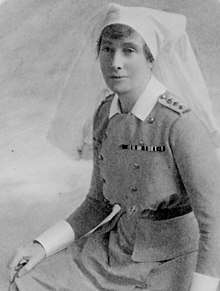Edith Campbell
Edith Campbell, RRC, MM (12 December 1871 – 1951) was a Canadian nurse. She was one of the first Canadian nurses to arrive in England to assist in the establishment of the Duchess of Connaught Canadian Red Cross Hospital, a field hospital in Taplow, Buckinghamshire, and serve during the First World War in both England and France, earning a number of medals including the Royal Red Cross, first class, and the Military Medal. She was also twice mentioned in dispatches.
Edith Campbell | |
|---|---|
 Edith Campbell[1] | |
| Born | 12 December 1871 |
| Died | 1951 (aged 79–80) |
| Nationality | Canadian |
| Education | Presbyterian Hospital, New York. |
| Occupation | Nurse |
| Known for | Nursing efforts during the First World War |
| Medical career | |
| Institutions |
|
| Awards | |
After the war, she was superintendent of the Toronto Branch of the Victorian Order of Nurses. Her medals and a number of her personal items are held by the Canadian War Museum.
Early life
Edith Campbell was born in 1871 in Montreal, Quebec. She was from a 'medical family'; her grandfather - Francis Wayland Campbell - was dean of the Medical Faculty of Bishop's College and her father and uncle were both physicians. She was known as "Daisy" at home. In 1907 she graduated from the school of nursing at New York's Presbyterian Hospital and subsequently worked in Manhattan and Montreal.[1][2]
First World War
Campbell enlisted in the Canadian Army Medical Corps in September 1914 at the age of 42.[2][3] She arrived in the United Kingdom on 24 October 1914 on the HMT Franconia.[2] She and her Canadian Army Nursing Service peers were known as "bluebirds" due to their blue nursing uniforms.[2]
As one of the first Canadian nurses to arrive at Cliveden, Campbell first assisted in the establishment of the Duchess of Connaught Canadian Red Cross Hospital, a field hospital in Taplow, Buckinghamshire, where Sir William Osler was the head physician. In April 1915, she was appointed its inaugural matron.[4][5][6]
While at Cliveden, Campbell was involved in a scandal known as "The Taplow scandal" or "Taplow affair" that included allegations of affairs, dishonesty, inappropriate treatment, drunkenness, and of nurses being overworked, not all relating to the actions of Campbell. Campbell and Charles Gorrell were removed from their posts. Gorrell and another man subsequently committed suicide. Campbell stated to Osler, as he attempted to reinstate her reputation, that "the worst wars are not all in the trenches".[4][7][8][9] Osler believed that Campbell had been unjustly dealt with and in response, threatened to resign.[4][6] Discussion of the affair was forbidden in the Osler household and Campbell did not regain her position as matron.[10]
On 22 June 1915, Campbell was mentioned in dispatches for her actions in England and France, and in October of that year she received the Royal Red Cross medal, first class.[2] She returned to France in 1916[4] and was subsequently mentioned in dispatches for a second time in 1917 for her bravery during enemy air raids at No. 1 Canadian General Hospital in Étaples, France, during which she attended to wounded nurses.[2][11] For this, she and five other nurses received the Military Medal on 25 September 1918.[2] Her citation read:[2]
For gallantry and devotion to duty during an enemy air raid. Regardless of personal danger she attended to the wounded sisters and by her personal example inspired the sisters under her charge.
Her other medals include the 1914 Star, the British War Medal, the Victory Medal and the 1935 Jubilee Medal.[11] She continued to serve with the Canadian Expeditionary Force until April 1919, when she was demobilised and returned to Canada.[3][4]
Later life
On her return to Canada, Campbell became superintendent of the Toronto Branch of the Victorian Order of Nurses.[2][12] She retired in 1934.[1]
Death and legacy
Edith Campbell died in 1951.[1] A collection of her medals and personal affects and letters is held by the Canadian War Museum.[11]
References
- Parks Canada Agency, Government of Canada (8 November 2018). "Hometown Heroes - Lachine Canal National Historic Site". www.pc.gc.ca. Retrieved 15 May 2019.
- Government of Canada, National Defence (7 November 2018). "Article | Canadian Army nurse served with 'gallantry and devotion'". www.army-armee.forces.gc.ca. Retrieved 14 May 2019.
- "Civilization.ca - Treasures Gallery - Edith Campbell's Military Medal". www.historymuseum.ca. Retrieved 14 May 2019.
- Lane, Vivien E. (2019). Perspectives on Sir William Osler's Own Health and Two Nurses in England: Matron Edith Campbell and Nurse Edith Edwards (PDF). American Osler Society. p. 39.
- Campbell, Edith (30 December 1916). "Letter from Edith Campbell to William Osler [Transcript]". Osler Library of the History of Medicine, McGill University. Osler Library Archive Collections, P417: Harvey Cushing Fonds. Retrieved 14 May 2019.
- Bernier, Maj-Gen Jean-Robert; McAlister, Vivian C. (April 2018). "The Canadian Army Medical Corps affair of 1916 and Surgeon General Guy Carleton Jones". Canadian Journal of Surgery. 61 (2): 85–87. doi:10.1503/cjs.003818. ISSN 0008-428X. PMC 5866141. PMID 29582742.
- Bliss, Michael (1999). William Osler: A Life in Medicine. Oxford University Press. ISBN 9780199880775.
- Bernier, M. G.; McAlister, V. C. (2018). "The Canadian Army Medical Corps affair of 1916 and Surgeon General Guy Carleton Jones". Canadian Journal of Surgery. 61 (2): 85–87. doi:10.1503/cjs.003818. PMC 5866141. PMID 29582742.
- "Biography – GORRELL, CHARLES WILSON FARRAN – Volume XIV (1911-1920) – Dictionary of Canadian Biography". www.biographi.ca. Retrieved 2019-10-04.
- Bernier, Maj-Gen Jean-Robert; McAlister, Vivian C. (April 2018). "The Canadian Army Medical Corps affair of 1916 and Surgeon General Guy Carleton Jones". Canadian Journal of Surgery. 61 (2): 85–87. doi:10.1503/cjs.003818. ISSN 0008-428X. PMC 5866141. PMID 29582742.
- "First World War Real Photo Postcard (RPPC)". www.friends-amis.org. Retrieved 14 May 2019.
- Fowler, T. Robert (2005). "The Canadian Nursing Service and the British War Office: The Debate Over Awarding the Military Cross, 1918". Canadian Military History. 14: 31–42.
External links
- Letters sent to William Osler, McGill Library
- Matron Edith Campbell, Canadian Great War Project